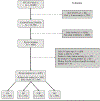Indicators of cigarette smoking dependence and relapse in former smokers who vape compared with those who do not: findings from the 2016 International Tobacco Control Four Country Smoking and Vaping Survey
- PMID: 31225672
- PMCID: PMC7065300
- DOI: 10.1111/add.14722
Indicators of cigarette smoking dependence and relapse in former smokers who vape compared with those who do not: findings from the 2016 International Tobacco Control Four Country Smoking and Vaping Survey
Abstract
Background and aims: It has been proposed that many smokers switch to vaping because their nicotine addiction makes this their only viable route out of smoking. We compared indicators of prior and current cigarette smoking dependence and of relapse in former smokers who were daily users of nicotine vaping products ('vapers') or who were not vaping at the time of survey ('non-vapers').
Design: Cross-sectional survey-based comparison between vaping and non-vaping former smokers, including a weighted logistic regression of vaping status onto predictor variables, adjusting for covariates specified below.
Setting: United States, Canada, Australia and England.
Participants: A total of 1070 people aged 18+ years from the 2016 International Tobacco Control (ITC) Four Country Smoking and Vaping Wave 1 Survey who reported having ever been daily smokers but who stopped less than 2 years ago and who were currently vapers or non-vapers.
Measurements: Dependent variable was current vaping status. Predictor variables were self-reported: (1) smoking within 5 minutes of waking and usual daily cigarette consumption, both assessed retrospectively; (2) current perceived addiction to smoking, urges to smoke and confidence in staying quit. Covariates: country, sample sources, sex, age group, ethnicity, income, education, current nicotine replacement therapy use and time since quitting.
Findings: Vapers were more likely than non-vapers to report: (1) having smoked within 5 minutes of waking [34.3 versus 15.9%, adjusted odds ratio (aOR) = 3.74, 95% confidence interval (CI) = 1.99, 7.03), χ2 = 16.92, P < 0.001]; having smoked > 10 cigarettes/day (74.4 versus 47.2%, aOR = 4.39, 95% CI = 2.22, 8.68), χ2 = 18.18, P < 0.001); (2) perceiving themselves to be still very addicted to smoking (41.3 versus 26.2%, aOR = 2.89, 95% CI = 1.58, 5.30, χ2 = 11.87, P < 0.001) and feeling extremely confident about staying quit (62.1 versus 36.6%, aOR = 3.22, 95% CI = 1.86, 5.59, χ2 = 17.36, P < 0.001). Vapers were not more likely to report any urges to smoke than non-vapers (27.7 versus 38.8%, aOR = 0.86, 95% CI = 0.44, 1.65, χ2 = 0.21, P = 0.643).
Conclusions: While former smokers who currently vape nicotine daily report higher levels of cigarette smoking dependence pre- and post-cessation compared with former smokers who are current non-vapers, they report greater confidence in staying quit and similar strength of urges to smoke.
Keywords: Former smokers; nicotine; non-vaping; relapse prevention; vapers; vaping.
© 2019 Society for the Study of Addiction.
Conflict of interest statement
Similar articles
-
Reasons for regular vaping and for its discontinuation among smokers and recent ex-smokers: findings from the 2016 ITC Four Country Smoking and Vaping Survey.Addiction. 2019 Oct;114 Suppl 1(Suppl 1):35-48. doi: 10.1111/add.14593. Epub 2019 Apr 23. Addiction. 2019. PMID: 30821861 Free PMC article.
-
Exposure to and perceptions of health warning labels on nicotine vaping products: findings from the 2016 International Tobacco Control Four Country Smoking and Vaping Survey.Addiction. 2019 Oct;114 Suppl 1(Suppl 1):134-143. doi: 10.1111/add.14550. Epub 2019 Feb 12. Addiction. 2019. PMID: 30618081 Free PMC article.
-
The impact of vaping and regulatory environment on cigarette demand: behavioral economic perspective across four countries.Addiction. 2019 Oct;114 Suppl 1(Suppl 1):123-133. doi: 10.1111/add.14538. Epub 2019 Feb 15. Addiction. 2019. PMID: 30575186 Free PMC article.
-
A Scoping Review of Vaping Among the Asian Adolescent Population.Asia Pac J Public Health. 2024 Nov;36(8):664-675. doi: 10.1177/10105395241275226. Epub 2024 Sep 10. Asia Pac J Public Health. 2024. PMID: 39256933 Free PMC article.
-
E-cigarette use and combustible tobacco cigarette smoking uptake among non-smokers, including relapse in former smokers: umbrella review, systematic review and meta-analysis.BMJ Open. 2021 Mar 30;11(3):e045603. doi: 10.1136/bmjopen-2020-045603. BMJ Open. 2021. PMID: 33785493 Free PMC article.
Cited by
-
A pilot study to examine the acceptability and health effects of electronic cigarettes in HIV-positive smokers.Drug Alcohol Depend. 2020 Jan 1;206:107678. doi: 10.1016/j.drugalcdep.2019.107678. Epub 2019 Oct 28. Drug Alcohol Depend. 2020. PMID: 31711874 Free PMC article. Clinical Trial.
-
Mandatory Nicotine Cessation for Elective Orthopedic Hip Procedures Results in Reduction in Postoperative Nicotine Use.Cureus. 2020 Dec 18;12(12):e12158. doi: 10.7759/cureus.12158. Cureus. 2020. PMID: 33489570 Free PMC article.
-
Will Australia's tightened prescription system reduce nicotine vaping among young people?Addiction. 2024 Oct;119(10):1693-1695. doi: 10.1111/add.16613. Epub 2024 Jul 6. Addiction. 2024. PMID: 38970334 Free PMC article.
-
How Should a Vape Shop-Based Smoking Cessation Intervention Be Delivered? A Qualitative Study.Nicotine Tob Res. 2024 Sep 23;26(10):1355-1361. doi: 10.1093/ntr/ntad236. Nicotine Tob Res. 2024. PMID: 38069625 Free PMC article.
-
A Qualitative Analysis of the Experiences of People Who Resumed Smoking Following Exclusive Electronic Nicotine Delivery Systems Use.Nicotine Tob Res. 2023 Feb 9;25(3):470-477. doi: 10.1093/ntr/ntac157. Nicotine Tob Res. 2023. PMID: 36448851 Free PMC article.
References
-
- Royal College of Physicians. Nicotine without smoke. A report of the Tobacco Advisory Group of the Royal College of Physicians; London, UK; 2016.
-
- National Academies of Sciences Engineering and Medicine. Public health consequences of e-cigarettes Washington DC; 2018.
-
- McNeill A, Brose LS, Calder R, Bauld L, Robson D. Evidence review of e-cigarettes and heated tobacco products 2018. A report commissioned by Public Health England; London; 2018.
-
- Beard E, West R, Michie S, Brown J. Association between electronic cigarette use and changes in quit attempts, success of quit attempts, use of smoking cessation pharmacotherapy, and use of stop smoking services in England: time series analysis of population trends British Medical Journal. 2016;354:i4645. - PubMed
Publication types
MeSH terms
Grants and funding
LinkOut - more resources
Full Text Sources
Medical


